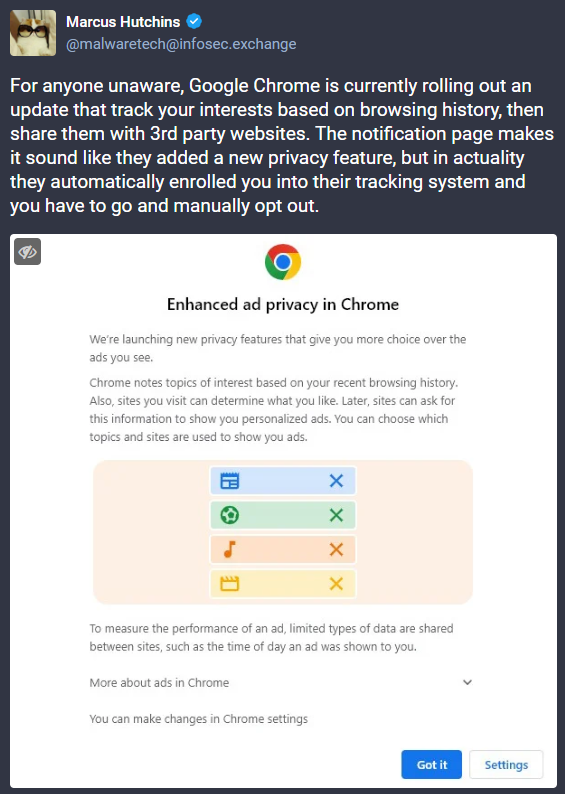As a Firefox user: Oh no, anyway
How do you know if someone uses Firefox?
Don’t worry, they’ll tell you
How do you know if someone uses chrome?
You can find their SSN and credit card number on the dank web in a list of 1k profiles for $1
The “dank web” is my jam!
Let me guess. You also do Crossfit and are a vegan?
The opposite actually.
You don’t work out at all and eat only meat?
Sell cows for stolen credit card numbers
Fucking based
Can you chill a little bit? Tf man…
I use firefox on arch, btw
This is the way
- Some masked radicals
Even though you got the downvotes it still made me laugh
Come on people lighten up a bit
You should too.
Oh no, all those interest based ads I’m never gonna see.
Ads?
“Hi, I’m calling about your recent interest in furry related content. We at Furry Fetish inc recently mailed you a catalogue of our products… Oh…you haven’t recieved it yet? Well, no worries. It was sent to 324 North Street…oh… You live on 325 North Street? No worries, your name is printed in large so whoever received it knows that is was for you and will probably deliver it to you…”
Interest based ads that everyone who has connected to the same wifi as you will now see. And it’s not just interest based ads. They will use this to calculate your whole personality and manipulate you and others based on that.
Interest based ads that everyone who has connected to the same wifi as you will now see.
My PiHole would beg to differ.
Every house needs a PiHole. I set mine up years ago and haven’t touched it since.
I should probably update it.
I’m happy to assist anyone on my wifi with installing an adblocker.
And unless google is using my data to hang a personalised billboard on my way to work, I’m not gonna be seeing any of them.
PiHole ftw
All hail Pi-hole
I did not know I would read this sentence in 2023 a decade ago.
For those who can’t go this far, there are ad blocking DNS services (although you’ll have to trust the provider instead of relying on yourself)
Interest based ads that everyone who has connected to the same wifi as you will now see
Oh shit
Good thing I’m using Firefox.
We have enhanced your privacy, pray we don’t enhance it more.
Google’s new ad system is called Topics. If you want to understand how it works, I would like to point you to Security Now Ep 935 in which Steve Gibson gives a pretty thorough analysis.
Marcus’ take in the image is overly simplistic and a bit FUD. The intention is for Topics to replace current ad tracking systems such as tracking pixels and other metrics. In conjunction with implementing Topics, Google is removing third-party cookies from Chrome, which will eliminate most of the current invasive tracking tools.
I’m not really a Google fanboy and I’ll probably just stick with Firefox personally, but everything about Topics sounds less privacy invasive than the way things are done now. If Google can force this change on the internet advertising market it will actually be an improvement for user privacy.
It’s not overly simplistic. It’s simply not a privacy feature if the core functionality is sharing your data. Privacy is if they stopped sharing data. Sharing more data is antithetical to privacy.
The transparency of Topics is at least an improvement. Previously you would be targeted - or rather discriminated - by highly questionable traits.
Hopefully with this move regulators will finally step in to outlaw the previous behaviour. That would be a minimal step in the right direction.
I doubt it. And I see no reason to believe Google is not going to continue that behavior, especially for those using a different browser.
Yes but this is local to your browser and you’ll be able to edit and/or clear it out if you choose.
It’s not perfect, and I’m aware of which community this is, but this is vastly better than 3rd party cookies.
You say that as if clearing out cookies isn’t also a thing one can do. All they’re doing is opting you into more directly handing them your data. And I didn’t see any mention that cookies will be discontinued by them anyway.
In the end, the big problem here is that it’s being routed as a privacy feature when it’s anything but. It’s just a different kind of privacy violation.
It’s simply not about privacy so it shouldn’t be labeled as such.
Theoretically, Topics doesn’t track anything beyond general interest categories (e.g. fishing, shoes, technology, dancing, etc) and would replace current data collection systems for targeted ads. If actually implemented as described, it would result in the ad market collecting and sharing less data on users. Basically, Topics is a step in the direction that you’re talking about.
I only see evidence that this replaces FLoC, but not cookies. Even Google’s statements about what cookies and data they collect hasn’t changed. This is a Chrome specific capability. Topics replaces Federated Learning of Cohorts which didn’t use cookies either.
Edit: nevermind. FLoC was a technology that allowed ad data to be collected even when third party cookies are disabled. Essentially it allowed chrome to collect data that Firefox and Safari already blocked when third party cookies are disabled.
So this isn’t replacing cookies at all, just FLoC. And it’s not replacing something “worse”. It’s still totally something that Chrome is collecting without cookies or any need to do so.
So with Topics and the removal of 3rd party cookies Google can then have a monopoly on behavior based ad tracking since they also have 64% of the browsing market. This is also bad.
This is absolutely the big problem. Google already has a near monopoly on internet advertising, with Facebook/Meta being their only real competitor. If Google has full control over the interest tracking/targeting technology and it’s inescapable because it’s part of the browser engine then they are effectively the gatekeepers of all internet advertising. Meta could still operate as an advertising agency but wouldn’t be able to implement any of their own technology, they’d have to just use what Google allows them to.
Definitely bad, but is it worse than tracking pixels (which came out of Facebook Beacon)? From an end-user privacy sense, I think Topics might be better as it doesn’t keep track of your specific web activity, only general interest categories for the websites that you visit within a period of three weeks - and the record is kept locally in your browser, not on a corporate server.
It’s not part of the browser engine. It’s part of the browser “chrome” (part of its namesake), the thing around the browser engine. So this isn’t in Edge and goes without saying, it isn’t in Firefox etc.
It’s still bad. Chrome is still a popular browser.
Edit: it does keep track of your browser activity, just doesn’t share the whole bunch of data with their parties.
Other browsers have been blocking third-party cookies for quite a while, so I cannot imagine any ad network which doesn’t already have alternative solutions in place and is therefore simply given more identifying data by this system. If Google genuinely wanted to change the ad model, they’d block tracking scripts by default.
Google Chrome? Privacy?

I mean…yeah? Is anyone surprised or shocked when Paramount Pictures releases a new movie? It’s literally Google’s whole business idea, they sell your data.
Title says “enhanced privacy” and text says they’re handing out more data to websites…
Uhm WHAT would be “privacy enhancing” about that?
Nothing, and they don’t claim it is, they just use ambiguous wording.
“Enhanced ad privacy features”. The ads are enhanced. Privacy is just involved.
you see, they respect the fact that you are a poor slob and there is no point advertising BMWs, large TVs and individual pillows to you. So they are making you less miserable about all the stuff you cant afford which is somewhat nice to your privacy isnt it?
Worst part, my adblocker is removed from Chrome, have to use a system wide adblocker now. Enjoy corporate world!
simple solution: use Firefox
Ad/trackerblocker are inbuild in Vivaldi, customizable with own filterlists, even blocks Cookie Advices and Anti Adblock warnings in Desktop and Mobile. I can use Extensions from the Chrome Store, but no really need them, most extensions are redundant in Vivaldi.
Gorhill already has an MV3 version of ublock. Why is no one aware of this!?
As part of a required test protocol, we will stop enhancing the truth in three… Two…
zrzztBecause they know that wording it like:
“We use our monopoly advantage to push anti-consumer features nobody wants. Enable extra tracking for no reason? Yes/no”
Enhances their privacy, so you (user) would not know whats being sent out.
I use Ungoogled-chromium. Chrome without google. Plain and simple.
Even more options and choices: https://chromium.woolyss.com/
Can’t see the image
It’s a twitter image that says,
“For anyone unaware, Google Chrome is currently rolling out an update that tracks your interests based on browsing history, then share them with 3rd party websites. The notification page makes it sound like they added a new privacy feature, but in actuality they automatically enrolled you into their tracking system and you have to go and manually opt out.”
There’s a screenshot of a pop up from Chrome that says, “Enhanced ad privacy in Chrome” with some marketing spin on how you get more choice on the types of ads you see.
Link to Mastodon https://infosec.exchange/@malwaretech/111019619190896517
Thank you. I added the link to the post.




















